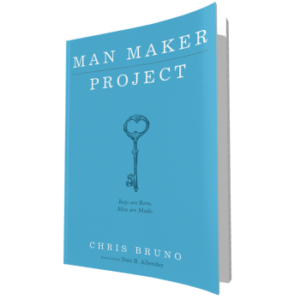Chris Bruno, a counselor in Colorado and a 2010 graduate of the MA in Counseling Psychology program at The Seattle School, has recently published a new book, Man Maker Project: Boys are Born, Men are Made. Here, Chris reflects on the difference between “father” as a noun, simply a role to fill, and “fathering” as a verb, a sacred calling that requires action. You can learn more about the book and the work Chris does in this interview.
The intensity of his eyes vacillated between pain, rage, and vacancy as he spoke of his experience of his father. Stephen* grew up the oldest of two boys in a family with an “ok” dad—that is, a father who did the typical status-quo dad-things like providing food and clothing, taking the kids to church, and not hanging out too late at the bars or chasing skirts. From the outside, the family seemed relatively stable. From the outside.
Stephen told me last week, “I had a dad, but I did not respect him. There was not much about him that I liked, and he certainly did nothing worth mimicking or modeling myself after. He was a complete dud. And he left me alone to father myself.”
And Stephen struggled. He regularly got poor grades, got picked on by the bullies, got overlooked by the girls, and found himself struggling with no direction or purpose in life. He told me, “I waited for dad to come. I waited for him to do something with me, for me, or even to me that would rescue who I was. But he did nothing. Nothing. He didn’t play a role. He filled a spot.” Now, as a mid-thirties man with a family of his own, Stephen wrestles with a malaise of depression, anxiety, loss of love for his wife, and a deep confusion about what it means to be a man.
Stephen’s story is not unique. In fact, it is far too common. There are a million variations, but ultimately the story rings scarily familiar for most—for men and women alike. Dad was not there.
In this story of pain and vacancy, “father” is a noun. It’s a spot. A place. A square block in a family tree. A seat at the proverbial dinner table or, better yet, a place on the couch. Father as a noun raises a generation of empty, angry, lonely, and confused people. Father as a noun leads us nowhere, envisions nothing for us, and creates no vision for our future.
 On the contrary, I believe the truest use of the word “father” is as a verb—an action, an intention, a purpose, a catalyst that sets into motion a series of God-ward results that change the course of history for individuals and society alike. Fathering is the highest calling of God on men; whether or not they have children, all men are designed and called to father.
On the contrary, I believe the truest use of the word “father” is as a verb—an action, an intention, a purpose, a catalyst that sets into motion a series of God-ward results that change the course of history for individuals and society alike. Fathering is the highest calling of God on men; whether or not they have children, all men are designed and called to father.
Fathering is a combination of strong and purposeful intention mixed with hopeful kindness. To father is not to fill a man’s genealogical spot, but for him to engage his world with masculine intentionality that speaks life, direction, faith, vision, and delight for generations to come. Father is a verb.
In my work as a therapist and ministry leader, I often have the distinct privilege of coming alongside people in stories of their deepest wounds. And while the craftiness of evil takes on many forms in its attempts to steal, kill, and destroy the beauty and glory of human dignity, far too often I see a common weapon of decimation: fatherlessness. This is an ancient war waged on men—reduce fathers to a role, remove fathers’ intentionality and replace it with passivity or violence, and render fathers uninterested or unequipped to engage their progeny.
Wherever “father” is merely a noun, fatherlessness exists, emptiness results, and death follows. But wherever “father” is a verb—where men father the world—hope grows, vision stirs, life springs, and the shape of history turns toward restoration.
Stories like Stephen’s have rung far too true for far too many for far too long. Yet the tide is shifting as a generation of men now stands on the precipice of engaging their God-given glory as men who father. A movement of men has begun to rise, decisively turning their hearts towards their children and their world with restorative intention. I believe it is this force of strength and kindness among men that will write new narratives for generations to come.
*Name and details have been changed to protect confidentiality.
Check back here in coming weeks for two more reflections from Chris Bruno.

